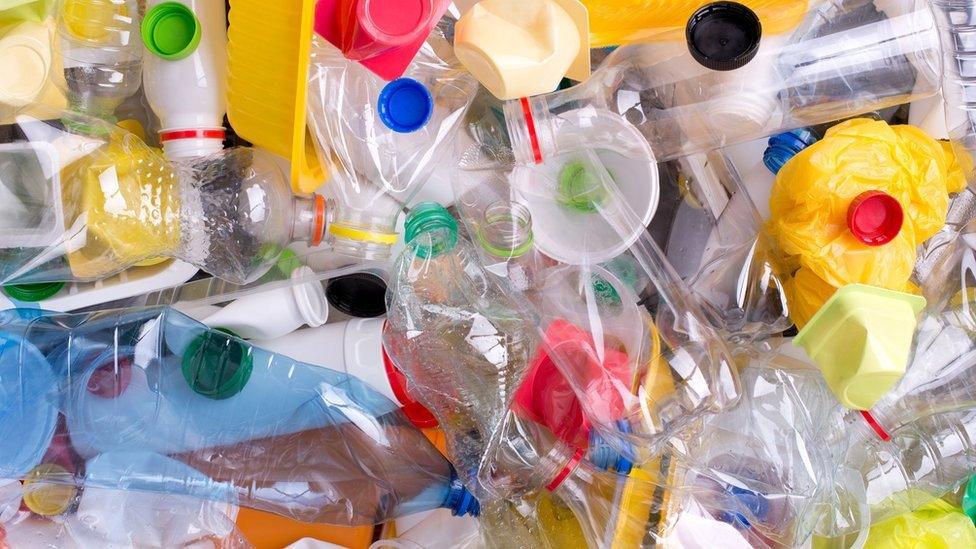Recycling: What's the difference between biodegradable, compostable and recyclable?
- Published
- comments

7.7 billion plastic bottles are used every year in the UK, according to Water UK
The Advertising Standards Authority (ASA) says waste terms such as 'biodegradable' and 'compostable' seen in product ads, are confusing and potentially misleading.
The ASA - which has the job of making sure that the public are not misled by advertisements - says that people often buy products which they believe are green choices and environmentally friendly, when in reality that is not necessarily the case.
They say plastic bottles, takeaway cups and food packaging that is advertised as being able to break down in the environment, may actually take an unlimited amount of time to break down, once thrown away.
As a result, the ASA wants waste terms such as "recyclable", "biodegradable" and "compostable" to be better explained.
In its report it said that people were likely to understand the differences between products that could be recycled and had been recycled, but were more confused about the other terms.
Recycling: The lifecycle of a milk bottle
Recyclable
Recyclable means an object can be collected and used again sometimes as an entirely new product.
Everyday items such as glass bottles and jars are often back on the shelves just weeks after being recycled.
This is known as closed-loop recycling - where an object is recycled into the same thing over and over again.
But much of the stuff you throw into your recycling bin ends up being transformed into something completely different.
Plastic bottles can be used to make anything from bin liners to fleece jackets, and used tin cans can become car or bridge parts.
GREENWASHING: While labels might be true in some cases, sometimes they are deliberately not telling the full story
Biodegradable
Biodegradable means that an item can be broken down and reabsorbed by the surrounding environment. Some things are naturally biodegradable, like food and plants, while other items can break down into harmful chemicals or gases.
Everything we use or make can be described as biodegradable because eventually everything will break down - from food or wooden containers to plastic packaging or steel machinery. But some items just take a very, very long time to break down compared to others. So, putting the word 'biodegradable' on food labels isn't very helpful for anyone trying to make greener shopping choices.
The ASA says that a number of those surveyed as part of their report were surprised to learn that some packaging labelled as 'biodegradable' has an unlimited timeframe to break down in the environment and could produce pollution such as greenhouse gases when it does.
Some packaging advertised as biodegradable may take much longer to break down and could release harmful chemicals or gasses
Compostable
Compostable on packaging means that not only are materials broken down in the environment but they can be turned - alongside food and other organic waste - into a soil-like material called compost.
Composting is a natural way of recycling and compost can be used in soil to help things grow.
But, not all plastic packaging labelled as "compostable" is home compostable and won't break down in a household compost bin.
Rubbish such as food waste can be put in a compost bin at home, but types of packaging may need to be taken to a recycling centre
Instead the items need to be taken to recycling centres and put in the right environment of high temperatures to break down properly.
The ASA report found that many people thought these items could be could be composted at home.
If compostable plastics get mixed up with the rest of your recycling, they could contaminate the lot.
How much do you know about recycling plastics? Take our true or false quiz below to find out.
If you can't see the quiz, click here.
"People assume because it's 'compostable', they can put it into their garden compost bin. When you explain that you can't and it's not going to compost without being taken to a council facility, it generated a really negative response," said Miles Lockwood, director of complaints and investigations at the ASA.
"With the issue of biodegradability, there is no definition of what makes something biodegradable. It can take years and sometimes degrade into microplastics - that created a real sense of disappointment and anger [among those surveyed in the report].
"Businesses need to work a lot harder to explain the difference," Mr Lockwood added.
- Published17 March
- Published14 June 2019
- Published11 November 2021
- Published26 October 2021
